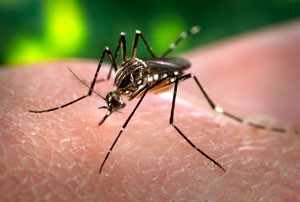Mosquito bites cause itching, swelling and redness because mosquitoes inject a protein substance into the blood when they bite. The protein substance makes it easier for the mosquito to suck blood because it inhibits the blood's ability to clot.
The best treatment is to use mosquito bite creams, pins or sprays. These products quickly and effectively relieve symptoms and should always be carried with you if you're going to be in places where there are a lot of mosquitoes.

Treatment for mosquito bites
Mosquito bites should be treated with over-the-counter anesthetic creams, pins or sprays. We recommend the following products for treating mosquito bites:
We recommend these mosquito bite remedies because they are effective and relatively inexpensive
You can see a comparison of mosquito bite remedies here.
If you are very bothered by your stings, you can use antihistamine cream, which can be bought over the counter at the pharmacy (but you should consult your doctor first). In cases where there is a lot of swelling, this can be treated with adrenal corticosteroids, but you should consult a doctor first.
Other care
While the products above are by far the most effective at relieving the itching and swelling of mosquito bites, there are a number of other things you can do to alleviate the symptoms:
- Elevate the affected area (for example, if the mosquito bite is on your leg, you can lie down and rest your leg on a chair)
- Cool the area around the mosquito bite with cold compresses or ice wrapped in a tea towel
- Gently wash mosquito bites with soap and water
If the itching and/or swelling worsens or persists for a longer period of time, you should consult a doctor.
Itching and swelling from mosquito bites
Itching, swelling and redness are the most characteristic symptoms of mosquito bites. Symptoms often appear shortly after the bite itself has occurred, but in some cases it can take up to 48 hoursbefore they show up. Symptoms will gradually decrease over a few days and then disappear completely.
The swelling can be large in some people, which is usually due to a allergic reaction to the mosquito bite. In addition, larger swellings can also be caused by the bites of other insects (such as bees or wasps), as these generally swell more than mosquito bites.
The more mosquito bites you get, the more likely you are to develop tolerance to the bites. In practice, this means that symptoms such as itching and swelling will be less in the future. In some cases, this may explain why children have stronger reactions to mosquito bites than adults. However, it should be noted that people who are bitten for the first time (mainly children) do not necessarily experience symptoms.
Can you become immune to the stings?
It is not yet known whether the body can become completely immune to the protein substance in mosquito bites, but several studies have shown that the body can develop a high degree of tolerance to it. Tolerance occurs when the immune system develops antigens to the substances that the mosquito injects into our body through its bite.
A Finnish study has shown that around 50% of young men living in the Finnish part of Lapland are tolerant to mosquito bites, while this is only the case for around 5% in the southern part of Finland, where mosquitoes are generally much less of a problem. This phenomenon is also seen in many other mosquito-plagued countries and areas.
These remedies are recommended for mosquito bites
Facts about mosquito bites
- AppearanceMosquito bites can vary in size and are reddish. The center of the bite can be whitish. The appearance depends a lot on the body's reaction and the species of mosquito that bites. Mosquito bites generally swell less than bee and wasp stings.
- Females and malesOnly female mosquitoes bite - males feed on nectar and other plant sugars. Female mosquitoes use the host's blood to develop their eggs.
- Mosquito swarms: There's no need to fear the large swarms of mosquitoes that you sometimes see in the summer (typically in meadows, forest edges, etc.) because they consist entirely of non-stinging male mosquitoes.
- 6 seconds: According to the American Asthma and Allergy Association a mosquito must bite for at least 6 seconds before a reaction is triggered in the skin.
- Protein substanceMosquitoes inject a protein substance when they bite their host. This substance makes it easier for the mosquito to suck blood because it inhibits the blood's ability to clot.
- Symptoms and symptomsThe most common symptoms of a mosquito bite are itching, swelling and redness - but more severe symptoms can occur in rare cases.
- Healing periodMosquito bite symptoms typically subside within a few days and the bite usually heals completely afterwards.
- Protection: The best way to avoid mosquito bites is by using the mosquito repellent and cover your body with clothing.
Video of a connector
In the video below, you can see how a mosquito's proboscis moves around the tissue of a mouse:
The small transparent "blocks" are the cells of the mouse. Notice how the mosquito's proboscis can split and move at different angles. This makes it easier for the mosquito to cover a large area when searching for blood vessels.
